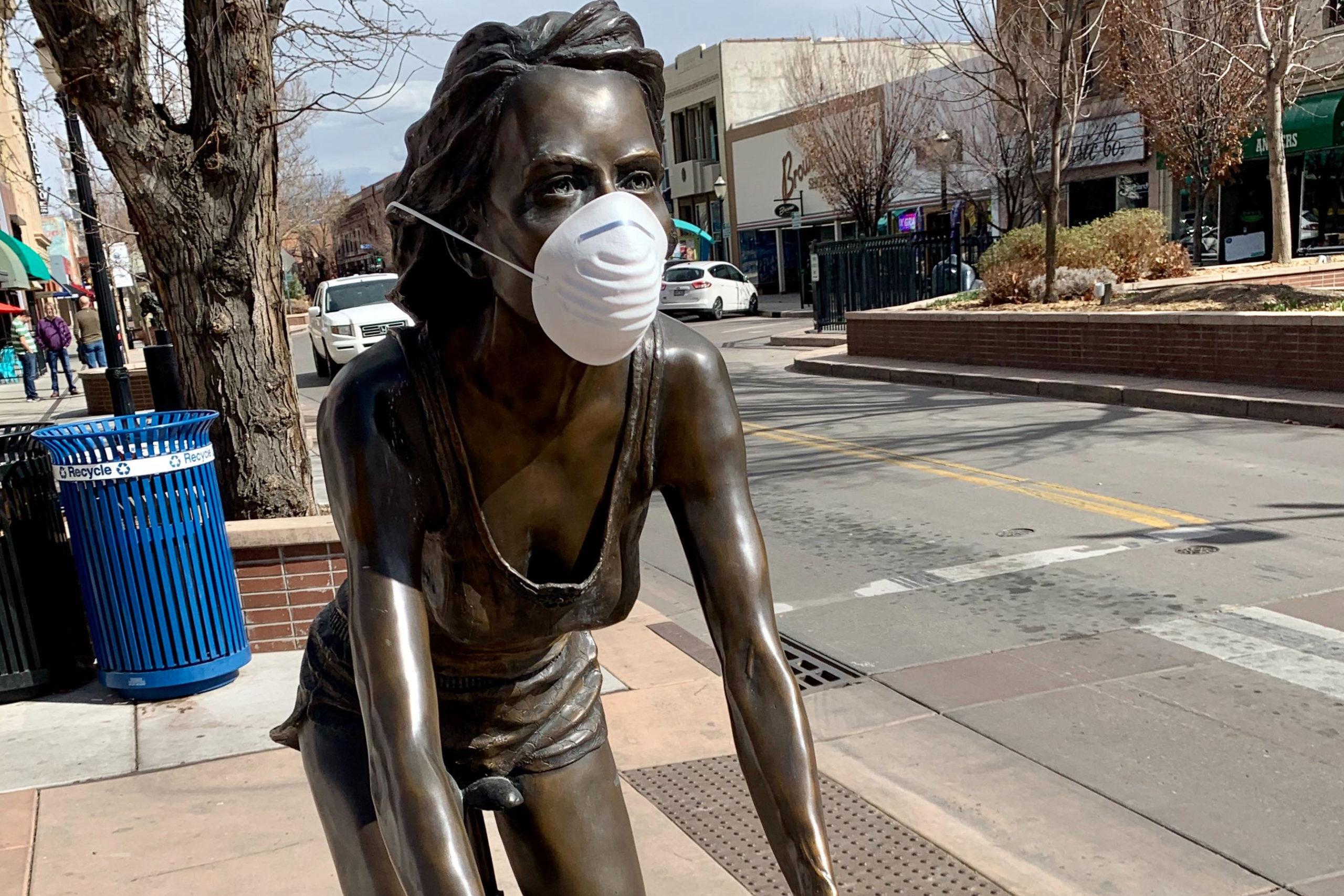
When it comes to coronavirus in Colorado, Mesa County earns high marks for low numbers.
The county with the largest population center on the Western Slope appears to be doing better than many Colorado places at keeping the virus at bay. The county’s total of 50 positive cases and no deaths is considered good enough that the state granted Mesa County an exemption to transition to looser restrictions last week.
To understand how Mesa County has managed that when neighboring counties with less population density have higher rates, it is necessary to look back before the pandemic had shifted the world.
Space and scabies have a lot to do with it.
Or as Mesa County Public Health Director Jeff Kuhr put it, “because of some bad luck, we were more prepared.”
Mesa County is one of the largest counties in the state with 3.3 million square miles — much of its open public lands populated mainly by sagebrush and cattle. Quite a few of the county’s 155,000 inhabitants tend to be spread out and socially distanced as a general way of life. The county also doesn’t draw a lot of international visitors like some of the hard-hit mountain resort communities.
“In Mesa County we are blessed to be living in an environment that already has social distancing,” said Dr. Michael Pramenko, a Grand Junction primary care physician. “That is certainly one of the factors here.”
Mesa County also has the gift of hindsight. The county has suffered some previous infectious outbreaks that have given county officials good practice and created networks for better controlling easily spreadable illnesses.
The serious skin rash, scabies, that is caused by burrowing mites, infested the Mesa County Detention Center in the fall of 2018. There was also a smaller outbreak of Hepatitis-A in the jail. New protocols were put into place to keep distance between inmates and to quarantine those who were infected. So, when the coronavirus hit, county health workers had already established strict monitoring procedures in the jail.
Last fall, the county also suffered through a norovirus outbreak that caused a rash of projectile vomiting in the schools. All 46 schools had to be shut down and 22,000 students kept at home for nearly two weeks while the schools were deep cleaned and disinfected and the virus had time to run its course.
That gave parents pre-pandemic practice at having their children at home. And school officials learned some valuable lessons about controlling virus spreads, setting policies for distance learning, and how to keep important amenities like the lunch programs going.
Kuhr said the county, where about one in five residents is over the age of 65, had also been working with area nursing homes and assisted living centers prior to the pandemic on protocols for avoiding infections. With the county’s help, those facilities were able to keep residents in their rooms, keep visitors out, and make sure employees were following handwashing and cleaning guidelines very early in the virus outbreak.
A network of homeless agencies, the Grand Valley Coalition for the Homeless, has established the same social distancing and education programs at all shelters and meal sites for that vulnerable population. About 12 percent of Colorado’s homeless population is estimated to be living in Mesa County.
So far, there have been no Mesa County coronavirus outbreaks in senior-living facilities, the jail, the homeless population or the Veterans Administration Medical Center — all locales or populations that are considered at higher risk of contracting the virus.
There have also been no cases reported at Colorado Mesa University which shut down for spring break before the virus was really taking hold in Colorado. Students were not allowed to return, which health officials say was a big factor in keeping Mesa County numbers down.
University spokesman David Ludlam said fewer than 225 students have remained on campus, with adequate dormitory and dining hall spacing for social distancing. On May 16, the university will hold its first virtual graduation.
Leading up to the state granting Mesa County an exemption from the stay-at-home-rules, there was not much visible flouting of the rules in an area known for its conservative, don’t-tread-on-me politics. Main Street was mostly empty. The Mesa Mall was closed. Churches were shut down. Parks were mostly deserted. The plug was pulled on big upcoming events like Country Jam and the Grand Junction Off-Road mountain bike races.
More recently, residents have been growing antsy. There was one horn-honking, flag-flapping rally up and down a main thoroughfare on a Saturday afternoon to protest business shut-downs. Letters-to-the-editor of the Grand Junction Daily Sentinel gripe about heavy-handed government coronavirus policies. Verbal mask-vs-no mask skirmishes have been reported outside grocery stores.
And, in the area’s peach country, a significant number of libertarian-leaning growers have said they don’t believe the virus is as bad as officials make it out to be. They are more concerned with the recent freeze of the majority of their peaches than they are with an invisible virus they compare to the flu.
Now that Mesa County has its exemption and many businesses are being allowed to open with limited capacity and social-distancing rules in place, some Grand Valley residents are growing even more restless. Many downtown shoppers are foregoing masks. Clusters of hikers and cyclists clog the riverfront trails. Some businesses are jumping the gun to reopen.
Mesa Mall opened one day this week only to close hours later because it was in violation of state rules that don’t allow businesses without outside entrances to open yet.
Bananas Fun Park, a family water-feature and go-cart business, and the Get Air at the Silo trampoline and bungee businesses are reopening by lumping themselves with gyms.
Kuhr has warned that reckless reopenings and behavior could result in Mesa County losing its state exemption.
It could also lead to a spike in the number of coronavirus cases. Kuhr has a formula for knowing when he would raise restrictions at the county level if those numbers do climb. Currently about 3.4 percent of the 1,652 people tested in Mesa County are positive for the virus. If that number would reach 10 percent that would trigger a stay-at-home order. So would 30 or more coronavirus patients being hospitalized. Currently there is only one.
Kuhr recognizes that much more testing needs to be done to know the true level of infection in Mesa County. He said the county currently has an ample number of test kits. Restrictions on who can be tested have loosened. A doctors’ order is still required for testing.
The county has also received a new testing device that can give results in 15 minutes. He said the health department plans to use that in nursing homes and with the homeless population to see if random testing shows that the virus might be lurking in places that it hasn’t yet shown up. If it does turn up, the county has plans to quarantine people in hotels.
Pramenko said until population-wide testing can be done, the numbers of those infected will be “drastically understated.”
He said for much of March and April he couldn’t even get symptomatic patients approved for tests. That has changed recently.
If there is one thing Mesa County health professionals and officials fear going forward it is mountain bikers.
Parking lots at some of the popular trail heads have been crammed with vehicles — many of them out-of-state. Those visitors tend to hit the liquor stores, grocery stores and restaurants like the uber-popular Hot Tomato pizza place in Fruita. Knowing that, the owners of the Hot Tomato are one of a number of restaurant owners who have opted to remain open only for take-out or curb and window pickup for the time being.
On Grand Junction’s Main Street, Bruce Benge, the owner of Benge’s Shoes, decided to open after moving out some of his shoe displays and marking safe-distancing intervals on the floor. Only seven customers can come in at one time because there are three employees. He said reopening has come with a steep learning curve, but it’s a step he feels like he needs to take to stay in business in a store that has been around for 109 years..
“My grandfather went through the Spanish flu in this business. He survived that so we will see if we can survive this,” Benge said. “I can tell you, it sure is a game changer.”









